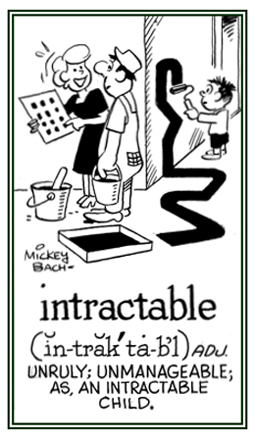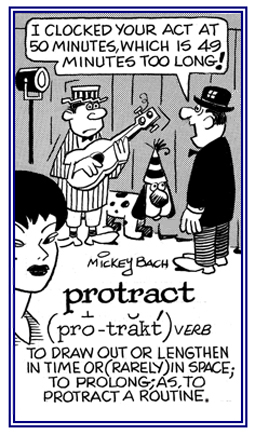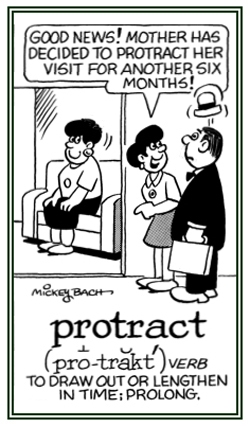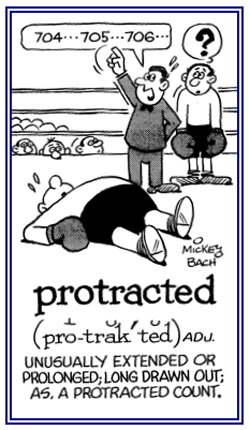tra-, tract-, trac-, -tractive, -traction, -tracting, treat-, trai-
(Latin: drag, draw together; a drawing out or pulling)
A commercial operation involved in exploring for non-renewable natural resources and removing them from the earth: Some examples of extractive industries that withdraw resources from nature are gas drilling, hunting, trapping, mining, and forestry; all of which are important parts of a country's economy.
1. A device which uses radial force to isolate parts or particles from a liquid: One type of extractor is the hematocrit, an apparatus which measures and determines the proportionate amounts of plasma and corpuscles in the blood.
2. A device that removes a liquid from an object: There are extractors that remove juice from fruit.
2. A device that removes a liquid from an object: There are extractors that remove juice from fruit.
galvanocontractility
The ability of muscle to respond to a continuous, direct electric current.
1. The use of the sun's rays for therapeutic treatment purposes: Heliotherapy has long been used as a treatment for various skin conditions.
2. The treatment of certain diseases by exposing the body to sunlight: Heliotherapy is also known as "solar therapy" or "solar treatment".
2. The treatment of certain diseases by exposing the body to sunlight: Heliotherapy is also known as "solar therapy" or "solar treatment".
1. The disposition of a person which is unruly or stubborn: The intractability or obstinacy that little Timmy showed was very difficult to deal with, especially when it was time to go to bed!
2. The nature or feature of something that is hard to manage or deal with: The intractability of the leak of the faucet in the bathroom couldn't be fixed easily, so Tom had to call the plumber!
3. The inability of something which is not easily cured or relieved: The intractability of John's pain in his back was something that he had to put up with in addition to taking some medication which didn't help him much at all.
2. The nature or feature of something that is hard to manage or deal with: The intractability of the leak of the faucet in the bathroom couldn't be fixed easily, so Tom had to call the plumber!
3. The inability of something which is not easily cured or relieved: The intractability of John's pain in his back was something that he had to put up with in addition to taking some medication which didn't help him much at all.
intractable (adjective), more intractable, most intractable
1. A reference to someone or something that is difficult to manage or to govern; stubborn: Intractable people are very difficult to influence or to get along with.
2. Pertaining to something that is not easy to mold or to manipulate: The intractable materials were too much trouble for the construction men to work with.
3. Descriptive of that which cannot be alleviated or cured quickly: The intractable pain in Hank's back was not going to be made less severe right away.

© ALL rights are reserved.

© ALL rights are reserved.
Go to this Word A Day Revisited Index
2. Pertaining to something that is not easy to mold or to manipulate: The intractable materials were too much trouble for the construction men to work with.
3. Descriptive of that which cannot be alleviated or cured quickly: The intractable pain in Hank's back was not going to be made less severe right away.


Go to this Word A Day Revisited Index
so you can see more of Mickey Bach's cartoons.
intractably (adverb), more intractably, most intractably
1. Concerning how an illness or problem is hard to deal with; unmanageably: The ailment that Martin had was intractably stubborn in healing and took various medications to get it under control.
2. Pertaining to how some people are obstinate or uncontrollable: Tony's sister was so uncooperative, cantankerous, and seemingly intractably difficult at times.
2. Pertaining to how some people are obstinate or uncontrollable: Tony's sister was so uncooperative, cantankerous, and seemingly intractably difficult at times.
maltreat (verb), maltreats; maltreated; maltreating
1. To abuse, to handle roughly or rudely; to treat someone in a cruel way: Jaden's cousin claims that he was maltreated by the prison guards when he was serving his time there.

© ALL rights are reserved.
Go to this Word A Day Revisited Index
Warren's mother, who maltreated him, was being investigated for this because he came to school with several bruises on his arms.
2. Etymology: from Latin mal-, "bad, wicked" + treat from tractare, "to pull".
Go to this Word A Day Revisited Index
so you can see more of Mickey Bach's cartoons.
The action of treating badly or the state of experiencing cruelties by others: The doctor was accused of providing maltreatments that made patients worse rather than to improve their physical conditions.
mistreat, mistreats, mistreated, mistreating (verb forms)
To treat someone, or something, badly or roughly.
portrait
portray
protract (verb), protracts; protracted; protracting
To extend, to draw out, to lengthen: The orchestra conductor agreed to protract the concert by adding two encores of his favorite music.

© ALL rights are reserved.

© ALL rights are reserved.
Go to this Word A Day Revisited Index


Go to this Word A Day Revisited Index
so you can see more of Mickey Bach's cartoons.
protracted (adjective), more protracted, most protracted
Descriptive of or relating to something that continues longer than necessary or expected: The brothers had a protracted argument about which one was going to mow the grass and who was going to pull the weeds in the garden; however, they reached an agreement after protracted negotiations.

© ALL rights are reserved.
Go to this Word A Day Revisited Index



